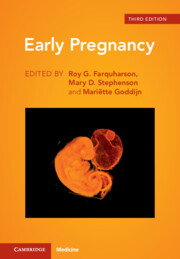Book contents
- Early Pregnancy
- Early Pregnancy
- Copyright page
- Contents
- Contributors
- Chapter 1 Novel 3-D Imaging Techniques in Early Pregnancy
- Chapter 2 What Is Endometrial Receptivity?
- Chapter 3 Pathophysiology of Chronic Endometritis
- Chapter 4 Clinical Management of Chronic Endometritis in Recurrent Pregnancy Loss
- Chapter 5 Implantation
- Chapter 6 Early Placental Development and Disorders
- Chapter 7 The Uncertain Science of Preimplantation Genetic Testing for Reproduction
- Chapter 8 Thyroid Physiology and Early Pregnancy
- Chapter 9 Early Pregnancy Core Outcomes
- Chapter 10 Thyroid Treatment Trials
- Chapter 11 Müllerian Duct Development, Diagnosis and Management of Anomalies
- Chapter 12 Candidate Genes in Pregnancy Loss
- Chapter 13 Inherited Thrombophilia
- Chapter 14 Guidelines on the Diagnosis and Management of Sporadic Miscarriage
- Chapter 15 Investigation of Recurrent Pregnancy Loss
- Chapter 16 Talking with Patients about Pregnancy Loss
- Chapter 17 Psychological Support after Pregnancy Loss
- Chapter 18 Tubal Ectopic Pregnancy and Pregnancy of Unknown Location
- Chapter 19 Medical Management of Tubal Pregnancy
- Chapter 20 Candidate Biomarkers for Prediction of Pregnancy Location and Viability
- Chapter 21 Diagnosis and Management of Extrauterine Pregnancies
- Chapter 22 Ultrasound to Diagnose and Predict Early Pregnancy Outcome
- Chapter 23 Molar Pregnancy
- Chapter 24 COVID and Early Pregnancy
- Chapter 25 Obstetric and Perinatal Outcome after Assisted Reproductive Technology Pregnancy Events and Complications
- Chapter 26 Obesity and Early Pregnancy
- Chapter 27 Dynamic Prediction Models for Recurrent Pregnancy Loss
- Chapter 28 Pregnancy Loss: From Cytogenetics to Genomics
- Chapter 29 Progesterone Use in Early Pregnancy
- Index
- References
Chapter 17 - Psychological Support after Pregnancy Loss
Published online by Cambridge University Press: 16 April 2025
- Early Pregnancy
- Early Pregnancy
- Copyright page
- Contents
- Contributors
- Chapter 1 Novel 3-D Imaging Techniques in Early Pregnancy
- Chapter 2 What Is Endometrial Receptivity?
- Chapter 3 Pathophysiology of Chronic Endometritis
- Chapter 4 Clinical Management of Chronic Endometritis in Recurrent Pregnancy Loss
- Chapter 5 Implantation
- Chapter 6 Early Placental Development and Disorders
- Chapter 7 The Uncertain Science of Preimplantation Genetic Testing for Reproduction
- Chapter 8 Thyroid Physiology and Early Pregnancy
- Chapter 9 Early Pregnancy Core Outcomes
- Chapter 10 Thyroid Treatment Trials
- Chapter 11 Müllerian Duct Development, Diagnosis and Management of Anomalies
- Chapter 12 Candidate Genes in Pregnancy Loss
- Chapter 13 Inherited Thrombophilia
- Chapter 14 Guidelines on the Diagnosis and Management of Sporadic Miscarriage
- Chapter 15 Investigation of Recurrent Pregnancy Loss
- Chapter 16 Talking with Patients about Pregnancy Loss
- Chapter 17 Psychological Support after Pregnancy Loss
- Chapter 18 Tubal Ectopic Pregnancy and Pregnancy of Unknown Location
- Chapter 19 Medical Management of Tubal Pregnancy
- Chapter 20 Candidate Biomarkers for Prediction of Pregnancy Location and Viability
- Chapter 21 Diagnosis and Management of Extrauterine Pregnancies
- Chapter 22 Ultrasound to Diagnose and Predict Early Pregnancy Outcome
- Chapter 23 Molar Pregnancy
- Chapter 24 COVID and Early Pregnancy
- Chapter 25 Obstetric and Perinatal Outcome after Assisted Reproductive Technology Pregnancy Events and Complications
- Chapter 26 Obesity and Early Pregnancy
- Chapter 27 Dynamic Prediction Models for Recurrent Pregnancy Loss
- Chapter 28 Pregnancy Loss: From Cytogenetics to Genomics
- Chapter 29 Progesterone Use in Early Pregnancy
- Index
- References
Summary
Pregnancy loss (PL) is a common complication in early pregnancy, occurring in ~25% of recognized pregnancies. Standard medical care after PL traditionally focuses on emptying of the fetus from the uterus. Historically the emotional impact of PL has been overlooked. However, research shows that PL has a negative psychological impact on women’s and their partner’s well-being, and that patients wish for post-PL care that attends to their emotional and psychological needs as well. This chapter summarizes the latest research on the psychological impact of PL, patient preferences for medical and supportive care after PL and in a new pregnancy and provides recommendations for care. Psychological impact and support after ectopic pregnancies and late pregnancy losses > 24 weeks are not specifically addressed in this chapter. Health care staff providing care to those with PL should be educated about the psychological impact of PL including that a first PL can cause emotional distress for both partners and that the psychological burden can increase with multiple losses. Informing patients that their emotional reactions to the PL are normal and to be expected without diminishing their impact is crucial. Information provision and empathic and sensitive communication is valued by patients and their partners. Structural changes are also needed to facilitate continuity in care and follow-up in order to promote overall well-being after PL.
Keywords
- Type
- Chapter
- Information
- Early Pregnancy , pp. 173 - 178Publisher: Cambridge University PressPrint publication year: 2025

